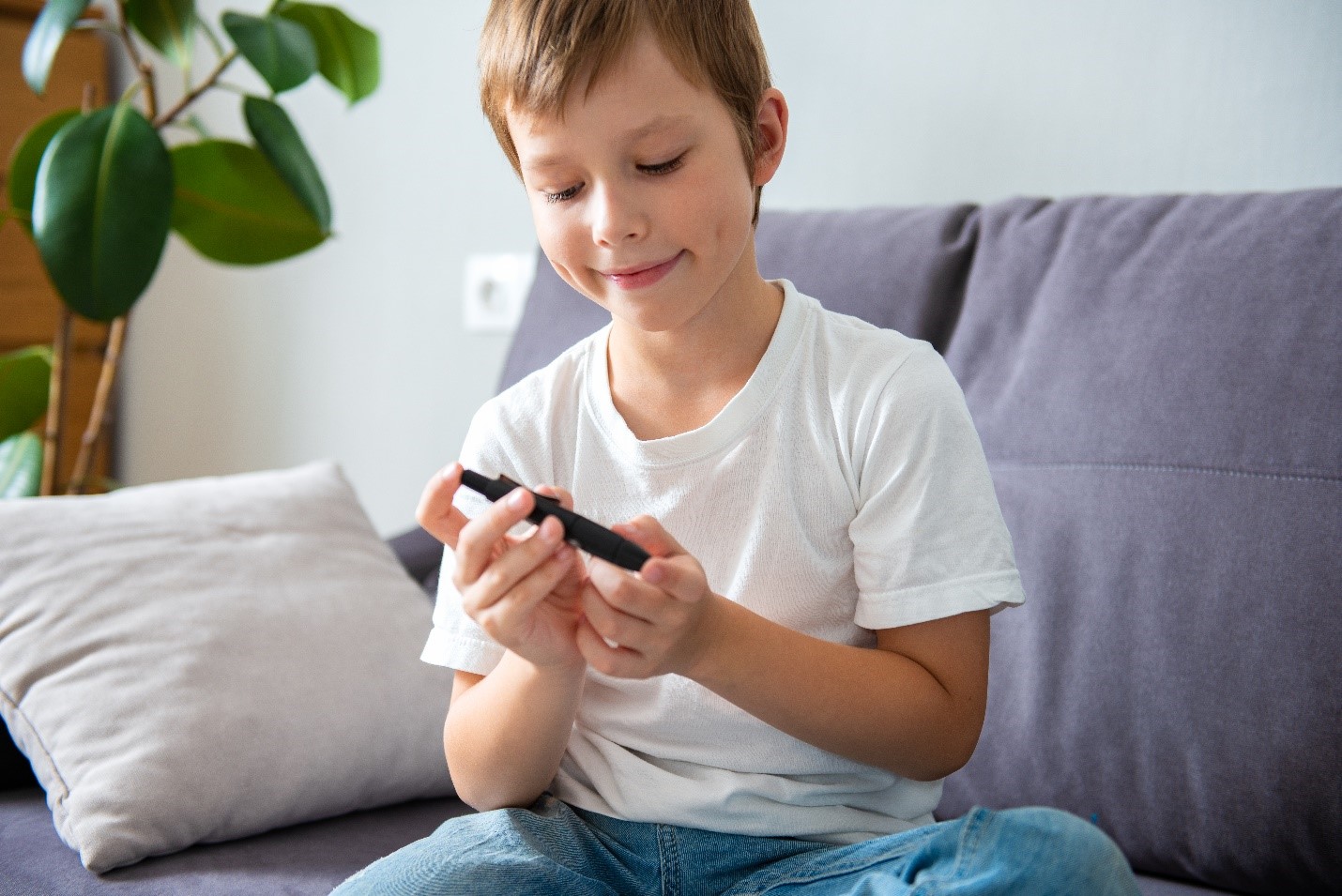
Type 1 Diabetes
Imagine your energetic child playing with friends when their body’s immune system suddenly attacks the cells in their pancreas. This attack disrupts their ability to produce insulin, which is vital for their body’s energy and growth.
Managing childhood diabetes is challenging. Contrary to popular belief, type 1 diabetes is not caused by eating too much sugar. It is an autoimmune disorder, and unfortunately, there is no known way to prevent it.
Type 1 diabetes can appear at any age; however, it tends to occur in children between 4 and 7 years old and between children 10 and 14 years old. Genetics can play a part in a child being diagnosed with type 1 diabetes. For example, if a child has a parent or sibling with type 1 diabetes, they have a slightly higher risk of developing the condition.
Type 2 Diabetes
Type 2 diabetes is a medical condition that arises due to an issue with the way the body regulates and uses sugar as a source of energy. Although it is commonly associated with adults, children can also develop type 2 diabetes. However, the number of children being diagnosed with it is increasing due to the growing prevalence of childhood obesity. In children who have type 2 diabetes, the pancreas can produce insulin, but the cells do not respond to it properly, leading to insulin resistance. This, in turn, causes a rise in blood sugar levels, putting additional strain on the pancreas to produce more insulin. If left untreated, high blood sugar levels can persist and cause damage to the body over time.
As the holiday season approaches, we often indulge in unhealthy behaviors that can increase the risk of developing type 2 diabetes. However, there are several ways to prevent this condition. These include maintaining a regular eating schedule, avoiding skipping meals, monitoring your carbohydrate intake, and staying physically active, among other things.
Instead of your child indulging in unhealthy behaviors this holiday season try these alternatives instead:
Since childhood diabetes usually develops quickly, knowing when your child may be at risk is imperative to their health. It requires a superhero-like investigation. Some signs and symptoms to pay attention to include increased thirst, extreme hunger, fatigue, fruity-smelling breath, unintentional weight loss, frequent urination, blurry vision, and more.
During this holiday season, it’s important to remember that young superheroes battling illness have a support system that includes their families, friends, teachers, and healthcare teams. With this network of allies, we can help these warriors thrive in the face of adversity and ensure that they enjoy a wonderful holiday.
How AFSPA can help
Well-Child Visits
The Foreign Service Benefit Plan (FSBP) covers well-child visits at 100% when visiting an in-network provider or any provider overseas and 70% of the Plan allowance when visiting an out-of-network provider in the U.S. FSBP also covers unlimited dietary and nutritional counseling for children.
Simple Step to Living Well Together Program (Healthy Action)
If you have been diagnosed with diabetes, FSBP will reach out to members who are 18+ years and older and ask that your provider submit your A1c laboratory results to us. If your A1c laboratory results are less than 8% during the calendar year, you can earn a $75 wellness incentive.
Livongo-Remote Diabetes Monitoring Program
The Livongo-Remote Diabetes Monitoring Program empowers those with diabetes to live a better life. At no cost to eligible FSBP members, personalized support and interventions are available for our members through a cellular-enabled meter and mobile app to help you make better decisions about diabetes management.
For more information contact 800-945-4355 or visit Livongo’s website at get.livongo.com/FSBP.
Lifestyle and Condition Health Coaching
Our Lifestyle and Condition Coaching Program (LCC) Health Coach will provide guidance, support, and resources for over 40 lifestyle and medical conditions to help you overcome obstacles that may be keeping you from realizing optimal health. You can talk to a Health Coach about your child’s diabetes to receive coaching that includes pediatric diabetes.
To enroll in a program, contact an LCC Health Coach at 1-866-533-1410. LCC Coaches are available Monday through Friday 8:00 a.m. – 8:00 p.m. ET. You may also enroll online at www.myactivehealth.com/FSBP. Participation in this program is voluntary and is available at no cost to members.
AbleTo
AbleTo is a web-based video conferencing personalized 8-week treatment support program designed to address the unique emotional and behavioral health needs of individuals learning to live with type 2 diabetes. You will work with the same therapist and coach each week to set reasonable goals toward healthier lifestyle changes.
If you feel you would benefit from this program, would like more information, or would like to enroll in this program please call 866-287-1802 or visit AbleTo’s website at www.AbleTo.com/enroll. This program is available to members in the 50 United States.
Copyright © 2025 All Rights Reserved by AFSPA.